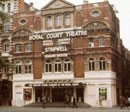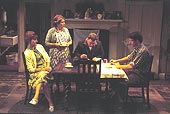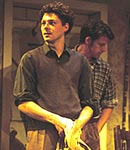|
Loading
|
|
|
Back to the Draining Board
The York Realist
by Peter Gill
Royal Court, London SW1
 Review
by Tom Sutcliffe, Saturday
Review (Saturdays, 7pm, BBC Radio 4), 12 January 2002
Review
by Tom Sutcliffe, Saturday
Review (Saturdays, 7pm, BBC Radio 4), 12 January 2002
When does a play become a history play? By and large, being set in 1960 wouldn't usually quite cut it. The date is in living memory for too many people in the audience — the clothes still in too many attics — for us to be able to cede it completely to the past. But Peter Gill's play The York Realist is so knowing about the past and its odd connections to the present that no other description will do as well.
 In
1964 Gill was an assistant director at the Royal Court, where he made his mark with
revelatory productions of DH Lawrence's dramas. Now, nearly 40 years on, he returns
to the Court with his own play, a Lawrentian study of the love affair between George,
a Yorkshire farm labourer, and John, an assistant director up from London and greatly
excited by the new possibilities of Sixties theatre.
In
1964 Gill was an assistant director at the Royal Court, where he made his mark with
revelatory productions of DH Lawrence's dramas. Now, nearly 40 years on, he returns
to the Court with his own play, a Lawrentian study of the love affair between George,
a Yorkshire farm labourer, and John, an assistant director up from London and greatly
excited by the new possibilities of Sixties theatre.
I'm sure that The York Realist was a pretty good evening at The Lowry in Salford, where the English Touring Theatre gave it its world première, but at the Court, in front of an audience of actors and directors, many of whom made their reputations in the Sixties, it was almost uncanny — an evening that suggested time travel might actually be possible. There was even a kitchen-sink on stage — a little nod to the theatrical revolution, which made plays like this possible in the first place.
 The
striking thing about The York Realist, though, is that, for all the knowing jokes
about period pieces, it mostly behaves as if the last forty years had never taken
place. And while that would usually be a damning phrase to attach to a work of art,
in this case it's what is best about it. The play serves as a reminder that the
theatrical upheavals of the Sixties weren't just a stepping stone to contemporary
theatre — a faintly embarrassing process to be gone through, like some kind of artistic
puberty — they were an honourable end point in themselves.
The
striking thing about The York Realist, though, is that, for all the knowing jokes
about period pieces, it mostly behaves as if the last forty years had never taken
place. And while that would usually be a damning phrase to attach to a work of art,
in this case it's what is best about it. The play serves as a reminder that the
theatrical upheavals of the Sixties weren't just a stepping stone to contemporary
theatre — a faintly embarrassing process to be gone through, like some kind of artistic
puberty — they were an honourable end point in themselves.
By some lights Gill's play might look old-fashioned. While onstage sex is now commonplace, for instance, the most explicit moment here occurs when George pops out to the scullery for a tin of Vaseline. The two men do not even exchange a kiss on stage. But the charge of their mutual attraction is all the more powerful for that restraint. There is, too, something stolidly unflashy in the dialogue — an overlapping construction of hesitations and awkwardnesses, which, line to line, gives little evidence of writerly bravura.
 As
the programme note puts it, it harks back to a time when regional accents "were
not simply accepted, they were celebrated" — and what could be more quaint than
that? Monty Python long ago buried the Northern drama of class anxiety and social
change, and yet here it is, witty and moving and more alive than ever.
As
the programme note puts it, it harks back to a time when regional accents "were
not simply accepted, they were celebrated" — and what could be more quaint than
that? Monty Python long ago buried the Northern drama of class anxiety and social
change, and yet here it is, witty and moving and more alive than ever.
"That's years old. I'd like it all modern" George's mother says, when John praises her battered old dresser. It can't help but occur to you watching, that anyone who complained about The York Realist's dramatic antiquity would be guilty of the same unthinking indifference to the virtues of the past.